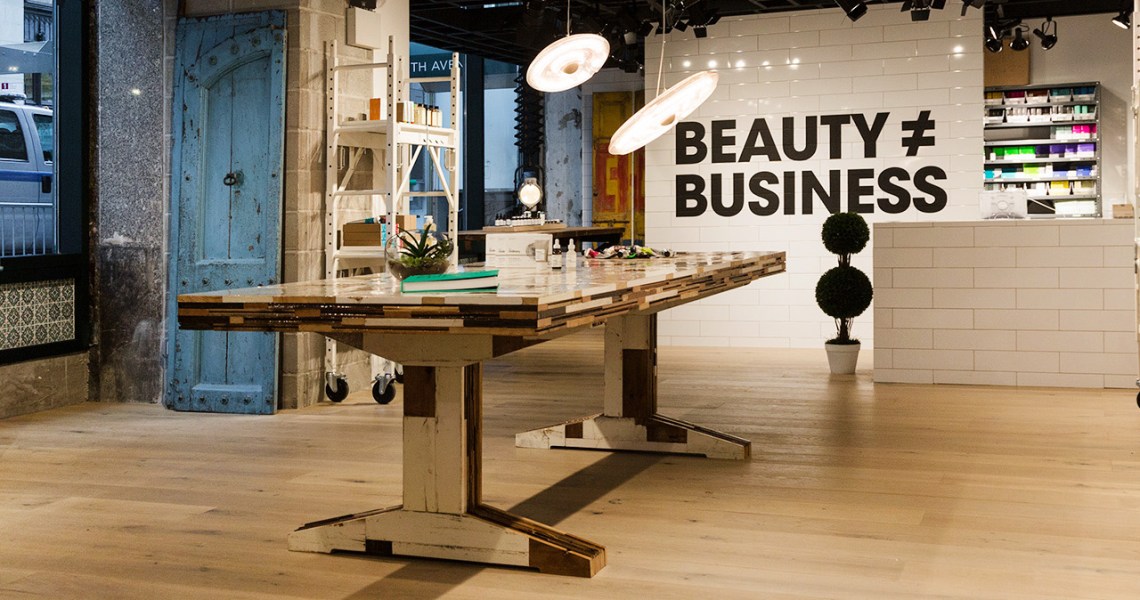Deciem is fully coming into the Estée Lauder Companies fold.
On Tuesday, ELC upped its 2017 29% stake in Deciem to 76%, valuing Deciem at $2.2 billion. In three years, Estée Lauder Companies plans to buy the rest of Deciem at a to-be-determined valuation. In 2020, Deciem, which is the parent company of The Ordinary, Niod and Hif, nearly doubled its sales, to approximately $460 million.
“When the investment happened in 2017, it was always on everyone’s mind that in the long term, this would be what would happen, in terms of their increase in ownership … One day, they would fully acquire us,” said Nicola Kilner , The Ordinary co-founder and CEO. “Brandon [Truaxe, who passed in 2019] always said, ‘If we could pick any forever home, Estée Lauder would be it — one of the best umbrellas of beauty brands in the world.’ And when we met Leonard [Lauder], he always put brand before business. As a brand, those are values that we want to hear.”
Fabrizio Freda, president and CEO of The Estée Lauder Companies Inc., echoed the companies’ similar ethos in an emailed statement. “Over the last four years, we have built a truly special long-term partnership with the incredible Deciem team…Nicola and her team have built and cultivated authentic brands with highly effective, must-have products using a vertically integrated model, and have fostered a uniquely transparent and engaging communication style. The company’s hero products, desirable innovation, and digital- and consumer-first high-touch approach have been instrumental to its success.”
Kilner said the phased approach has allowed Deciem to prove its original concept. “Back in 2017, the business was less than 10% of what it is now, in terms of revenues. At that stage, you need some investment to help grow and get to your potential, but you still need to maintain control and founder ownership to see what you can achieve.”
In 2020, Deciem’s hallmark brand The Ordinary expanded with both Ulta stores and Sephora.com. Additionally, it will reach more customers via Ulta’s partnership with Target and Sephora’s with Kohl’s this year. Beyond access, Kilner said the brand has seen TikTok “play a huge growth role.” “It’s been fascinating, but again, it’s because it’s a platform where organic TikTok videos, not necessarily driven by influencers, can go viral,” she said.
ELC’s acquisition of Deciem follows a similar trajectory as its purchase of Dr. Jart+. In November 2019, the conglomerate paid $1.1 billion to take over the rest of Dr. Jart+ at a $1.7 billion valuation.
Ad position: web_incontent_pos1
Operationally, Kilner said, “It’s quite a boring transaction, because nothing really changes.” She will stay on as CEO, alongside chief scientific officer Prudvi Kaka, chief operating officer Stephen Kaplan and the rest of the Deciem team.
While Kilner said there is still much more that Deciem wants to do with The Ordinary, the greater partnership with ELC will further fuel The Ordinary’s sister brands. “We definitely want to keep creating new brands. We have six brands at the moment, but as you know, Deciem comes from the word 10 [the Latin word decima means tenth].” On Wednesday, Deciem will be unveiling its first fragrance, Shop, under its Abnomaly brand, which will sell for $17 at Deciem stores and Deciem.com. Created by Truaxe and London-based fragrancer Azzi Glasser, the fragrance is derived from the scent the company features in its stores, which customers have been requesting. Additionally, on March 1, The Ordinary’s website will have a new look and feel for all of its brands.

“Brandon knew that smell is a tricky sense to convey through space, especially invisibly, and [challenged] me to create a fragrance that could transport [someone] directly into the world of Deciem. He wanted a feeling of being lifted into a comforting, cozy bubble with a touch of edginess,” said Glasser.
While The Ordinary is the hero Deciem brand, for now, Kilner believes that the company’s larger incubator structure is what put it on the map.
“Back in 2013, we said, ‘By creating 10 brands at once, we can do more for each brand. We can have our own production, we can have our own labs, we can do our own PR,” she said. “In the startup days, it was more a risk [minimizing] strategy, in terms of knowing whether any of these trends or brands were going to work. But we have more concepts we want to get into. At our hearts, we are and always will be an incubator.”




